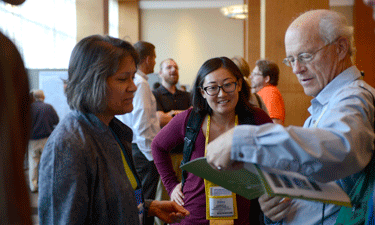 Many students struggle with having the correct skill set or knowledge base for a job in recreation. Students continually hear the calls for more experience; however, it is sometimes difficult to obtain such experience. While this presents a challenge for students who may not have the work experience preferred, there are certain things they can do to give themselves a competitive edge. Students can use current or future skill sets and knowledge to bridge to their next professional endeavor.
Many students struggle with having the correct skill set or knowledge base for a job in recreation. Students continually hear the calls for more experience; however, it is sometimes difficult to obtain such experience. While this presents a challenge for students who may not have the work experience preferred, there are certain things they can do to give themselves a competitive edge. Students can use current or future skill sets and knowledge to bridge to their next professional endeavor.
Bridging is the process of preparing yourself for your next position by developing the skill set necessary for that position. When attaining full-time experience can be difficult, students can prepare themselves for that job opportunity using R.B. Kauffman’s bridging theory.
Skill Sets
In developing your skill sets, it is important to take advantage of your academic advancements as well. Internships are a way you can gain professional experience and begin networking contacts and skills that relate back to the classroom. Typically, internships are offered when students have completed all course work or during the summer of their junior year. Scheduling the internship after the course work makes it easier for students to apply all the knowledge learned throughout the curriculum.
Perhaps one of the best ways to gain skill sets would be to volunteer in your community. Volunteering can give students a way to see work in a realistic sense. Always keep in mind that when choosing a place to volunteer, select one where you would enjoy working. Volunteering highlights your willingness to be involved with that facility.
Another way to advance your skill set is to earn notable certifications. Professional certifications allow students to bring more to the table in job applications and interviews. At Northwest Missouri State University, the faculty give students multiple opportunities to complete concentration-appropriate certifications. Continuing your education is professionally noteworthy, as it shows you are enhancing your knowledge and skills in the right direction, demonstrates self-determination and indicates the motivation to further oneself.
It is also important to get involved in professional clubs at your university. Whether a majors club or a community service organization, professional participation helps you stay current in the field and possibly do something positive for the community. Involvement in clubs and organizations, by their nature, helps you network with future professionals. These relationships, if nurtured, can grow to become fantastic professional friendships into the future.
Knowledge Beyond the Classroom
Being a recreation major means that it is important for us to be involved, and a great way to start your involvement is by attending conferences. Attending a conference gives you a type of knowledge that you cannot learn in the classroom; it supplies you with new information that you could not receive elsewhere. Beyond attending for networking and learning, going to conferences can also supply you with Continuing Education Units (CEUs), helpful for those seeking and keeping various certifications. Many professionals develop friendships in the field at conferences and training, and conferences can give you new ideas to take back to your own communities.
Presenting at a conference is a great way for students to work on public speaking, and it initiates self-study in researching a topic in depth. Many of us have given presentations in the classroom, but doing so at a conference gives us the added opportunity to network and meet other professionals.
Networking, networking, networking. Getting to know other professionals is extremely important for us as future professionals. Networking and getting to know others will help open doors into the future. Students should hand out business cards or résumés (when appropriate) as they talk to others about their future in the profession. For instance, many folks feel more at ease hiring someone they already know and trust.
Future Recommendations/Issues
As a student, any professional disadvantages are self-imposed. We need to make the extra effort to take in as much knowledge and experience as possible from those around us. Through active participation, we can build our résumés, give ourselves a competitive advantage and extend our professional network. Focusing on going that extra mile is creating that advantage for yourself. So, do yourself a professional favor and start volunteering and getting involved. These endeavors will help us improve skill sets and knowledge beyond the classroom, and most importantly, they will help you become the best future professional you can be.
References
Bok, D. (2006). Our Underachieving colleges: a candid look at how much students learn and why they should be learning more. New Jersey: Princeton University Press.
Kauffman, R. B. (2010). Career Development in Recreation, Parks, and Tourism. Champaign: Human Kinetics.
Taylor, H. &. (2003). Certifiably Worth It: The Benefits of Certification Are Endless. Parks and Recreation, 34+.
Mary Tapps and Jared Dowis are graduate students at Northwest Missouri State University. Tyler Tapps, Ph.D., is an Assistant Professor at Northwest Missouri State University in the Recreation Department of Health and Human Services.

